Coronavirus Australia live news: Wage growth at historic low; More than 25,000 abandoned Melbourne ahead of second wave
Australian wages rose at the lowest annual rate ever recorded last financial year in both the private and public sectors.
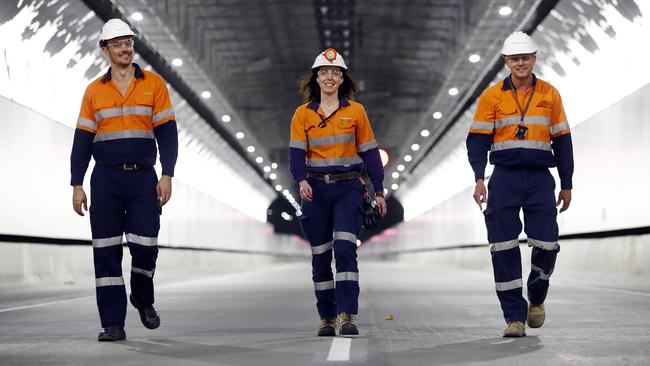
- Record Melbourne exodus revealed
- Qld won’t talk to NSW on borders
- Court rules Victoria curfews valid
- Frecklington out as LNP leader
- No new cases in Victoria
Welcome to our live coverage of the fallout of the coronavirus pandemic. Melbourne suffered a record exodus ahead of the second wave, new data shows. NSW’s efforts to try and ease border ‘chaos’ with Queensland has been met with silence. Australia’s “major risk” in its ongoing battle against COVID-19 is complacency after the country recorded its first day of zero community transmission, the acting chief health officer said today. Australia will suffer the economic equivalent of a COVID-19 crisis every year by 2050 if policymakers don’t act against climate change: Deloitte Access Economics.
Dow Jones 11pm: Europe aims to emerge smarter from lockdowns
One by one, governments across Europe are reintroducing strict new measures to tame a resurgent pandemic after concluding that light-touch strategies aimed at containing Covid-19 have run out of road.
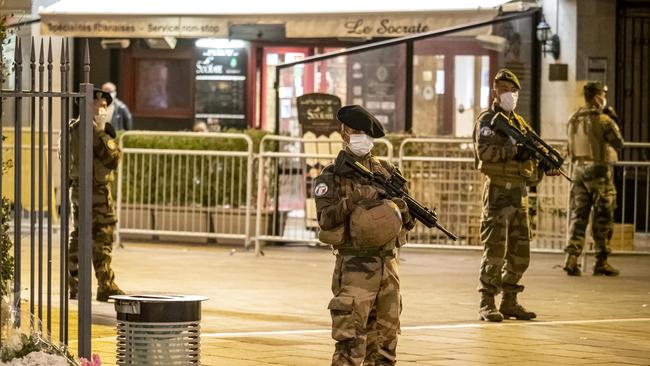
Britain, France, Germany, Ireland, Austria and Belgium are all now back under pandemic-containment regimes similar to those imposed in the spring, with bars and restaurants shut and people’s freedom to socialize with others curtailed. Schools by and large remain open, though, and governments have expressed hope the new restrictions will be lifted within weeks.
Some public-health experts say the reimposition of lockdowns shows the middle-way policies deployed over the summer, such as restrictions targeted at specific places or demographic groups, haven’t worked. New coronavirus cases in the European Union and the U.K. are running in excess of 175,000 a day on average, according to the latest official tallies, while in the U.S. daily cases are around 80,000. Without tougher action, these governments say hospitals in many places will be overwhelmed in weeks.
Read the full story here.
Glynis Traill-Nash 10.30pm: Frocked up to frolic on the front lawn
Like some 100,000 others on Melbourne Cup Day, Olivia Molly Rogers usually finds herself frocked up at Flemington to spend the day surrounded by fillies and finery, but this year’s audience-free event will see Rogers and fiance Justin McKeone celebrating the race that stops a nation at home.
“We’re still getting dressed up,” Rogers said. “We’ll be set up at home, we’ve got a nice big TV and we’ll make it feel as much like the races as we can.”
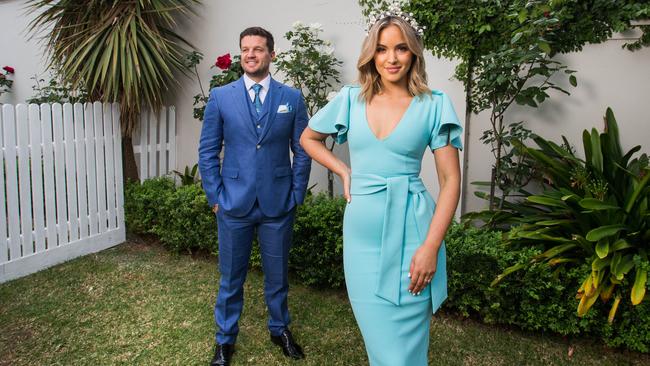
She said the easing of lockdown restrictions was perfectly timed to meet up with a small group of family or friends for the occasion: “It’s the perfect opportunity to get out of trackies and activewear and feel good about yourselves.”
A speech pathologist and Miss Universe Australia 2017, Rogers is the ambassador of Myer Fashions on Your Front Lawn — the annual Fashions on the Field competition’s digital pandemic pivot.
Winners of the Emerging Designer Award and Milinery Award will be announced online on Cup day, and men’s and women’s national winners will be announced at Thursday’s Oaks day.
Some novelty categories — Mad Hatters, Cup Week Costumes, Family Ties and Lounge In Style — have been added so everyone can get involved at home.
Read the full story here.
Ewin Hannan 10pm: Bid to set rules for working at home
The ACTU will devise a new claim on behalf of white-collar employees working from home, as a union survey finds a majority of people working remotely are struggling to achieve balance between their work and home life.
Members of the ACTU executive will meet on Wednesday to discuss the new claim and the results of the survey, which was commissioned by the peak union body after the COVID-19 pandemic saw an explosion in the number of people required to work from home.
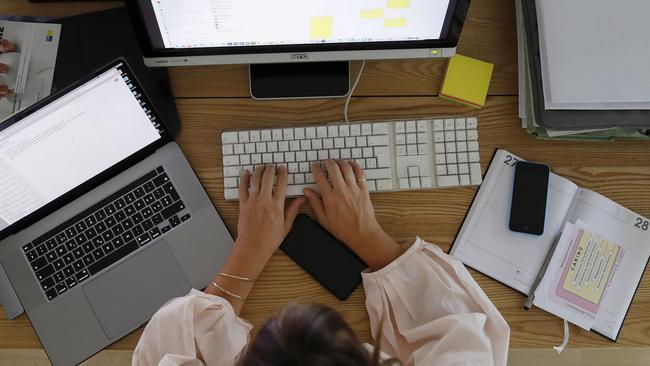
The survey, which sought insights into workers’ attitudes to working from home ahead of remote work becoming a more permanent feature of the labour market, found 55 per cent of respondents were having problems achieving a healthy separation between work and home life. The Australia Institute’s Centre for Future Work estimates up to two million workers could feasibly work full-time from home as of today, and estimates the number could eventually rise to four million, or 30 per cent of the workforce.
Read the full story here.
Rachel Baxendale 9.30pm: Curfew challenge shown the door
Victoria’s Supreme Court has dismissed Mornington Peninsula cafe owner Michelle Loielo’s challenge to the Andrews government’s coronavirus curfew.
Lawyers for Liberal Party member Ms Loielo had argued her business suffered as a result of the 8pm to 5am curfew, which was imposed on Melburnians in August and September.
On Monday, Justice Tim Ginnane found that while the curfew was an unprecedented restriction on human rights and liberties, he accepted evidence it was proportionate in light of the pandemic.
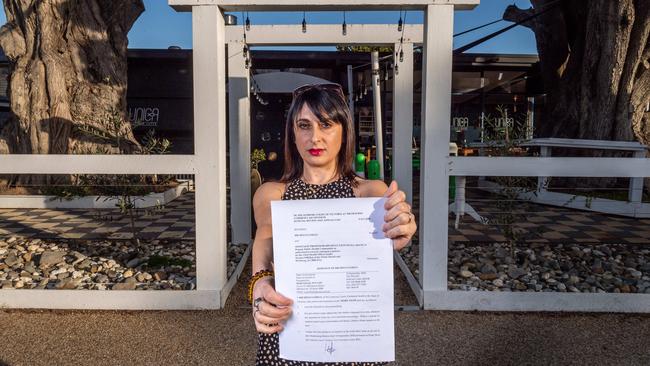
Ms Loielo brought her case against Victoria’s former deputy public health commander Michelle Giles, in light of Associate Professor Giles’ role in advising the Andrews government on imposing the curfew.
During the course of proceedings, lawyers for the government unsuccessfully attempted to have Professor Giles’s advice suppressed.
Justice Ginnane found that Professor Giles had “adopted a public health perspective using a precautionary approach” in advising on the curfew.
“I accept that she did consider the effect of the curfew on human rights and the effects of it on people in Victoria – she had experienced the effects of Stage 4 restrictions, herself,” he found.
Read the full story here.
Rachel Baxendale 9pm: Essential hospital data still a mystery
Victoria’s Department of Health and Human Services says it is still “looking into” the numbers of people who acquired COVID-19 while being treated in hospital for other conditions, almost two months after Chief Health Officer Brett Sutton said the department “can and should collect” such data, and pledged to “look into” making it publicly available.
DHHS on Monday released local government area data showing the locations of deaths and cases during the state’s coronavirus pandemic, as well as information on the gender and ages of the 819 people who have died with the virus in the state.
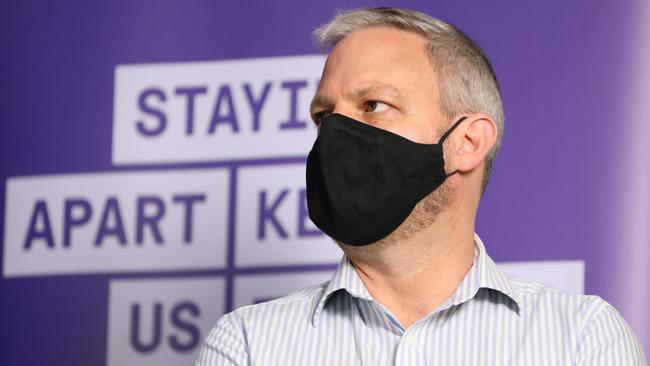
However, the department cited “complexities” associated with determining whether the patients had acquired the infection while in hospital in explaining why it was yet to provide patient death and case data — despite providing such data on a daily basis on residents of aged-care facilities, regardless of whether they acquired the infection at the facility.
“Understanding where someone caught coronavirus — the circumstances and location of acquisition — is often not known or obtainable, particularly during the peak of the pandemic,” a DHHS spokeswoman said.
“In Victoria, all deaths with a positive coronavirus diagnosis are included in the state’s toll, regardless of whether it was the overarching cause of death.
“This reporting is consistent across all states and territories to ensure the figures are comparable across the country.”
DHHS said some of the “complexities” in determining whether a coronavirus case was acquired at a hospital included the lack of an internationally accepted definition of hospital-acquired COVID-19, and the 14-day incubation period.
Read the full story here.
Tessa Akerman 8.30pm: Bureaucracy bordering on emotional cruelty
In just one week, Carmen Barnsley’s sister Jane saw a doctor for an infection in her foot, was diagnosed with cellulitis, hospitalised and died last Tuesday morning from septic shock.
For more than a week, Ms Barnsley, who lives in Mount Camel, 50km east of Bendigo, has been fighting to get a permit to travel to NSW, first to visit her sister while she was in hospital and now to arrange her funeral.
“My sister was my best mate. When I do it, I’m going to do the right thing by her,” Ms Barnsley said.
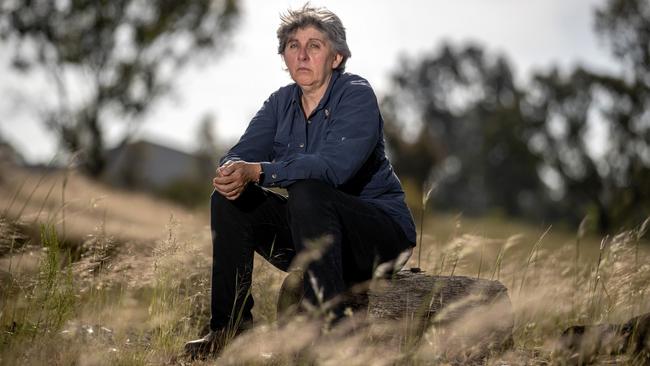
Amanda Hodge 8pm: Suu Kyi harnesses civil war to wage politics at polls
At least 2.6 million eligible voters from Myanmar’s ethnic minorities deemed to live in conflict areas have been locked out of the country’s third elections this Sunday, even as Aung San Suu Kyi’s ruling party pushes ahead with polls amid a sharp surge in COVID-19 infections in its Buddhist heartland.
The National League of Democracy-led government has refused to postpone elections, despite COVID-19 cases soaring in cities such as Yangon where it is tipped to win all 44 parliamentary seats up for grabs, and several dozen other parties calling for a postponement.
That has prompted a flood of criticism as well as concerns — including from the UN — over whether the weekend’s polls, expected to return Ms Suu Kyi and her NLD party to power, can be fair.
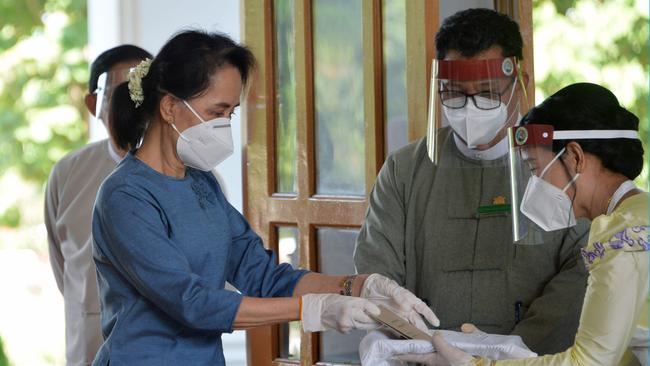
AFP 7.30pm: Global death toll tops 1.2 million
More than 1.2 million people have died of coronavirus around the globe, according to tally by the news service Agence France-Presse.
A total of 1,200,042 deaths had been recorded from 46,452,818 cases, with nearly one death in every five in the US, the world’s worst-hit country.
The US has seen 230,996 deaths from 9,207,364 infections with Brazil registering 160,074 fatalities from 5,545,705 cases, India 122,607 deaths and 8,229,313 cases, Mexico 91,895 deaths and 929,392 cases and Britain 46,717 deaths from 1,034,914 cases
READ MORE: Victoria’s record exodus revealed
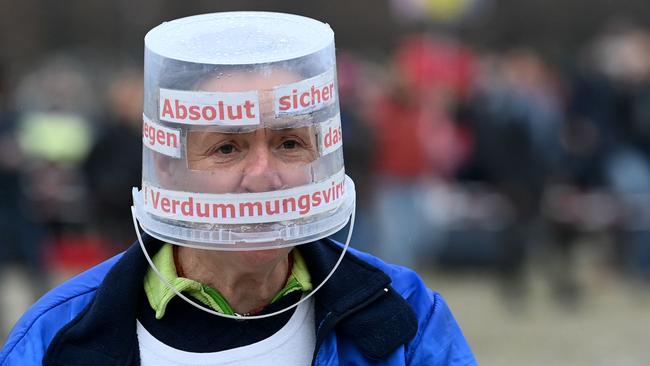
The Economist 7pm: Pandemic may cause fewer babies in rich countries
It is too early, by a few months at least, to be sure what the effect of COVID-19 will be on fertility rates. But different patterns seem to be emerging in rich and poor countries. Few women want to have a child in a time of uncertainty. In the rich world many are holding off starting a family or adding to it. But in the poorest places, where women often have less choice in the matter, a baby boom may be in the offing.
Governments are already trying to adapt. It is not just Singapore trying to boost birth rates. Japan’s new Prime Minister, Suga Yoshihide, last week called for health insurance to cover in vitro fertility treatment. Japanese government figures showed an 11 per cent fall in new pregnancies in the three months from May relative to last year.
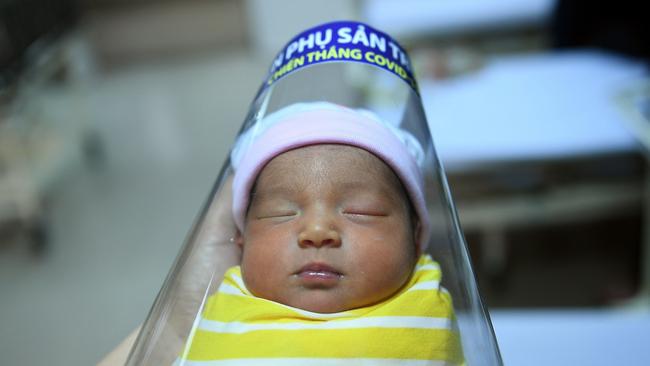
Sarah Toy, Sumathi Reddy, Daniela Hernandez 6.20pm: Doctors crack mysterious long-term effects
Nearly a year into the global coronavirus pandemic, scientists, doctors and patients are beginning to unlock a puzzling phenomenon: For many patients, including young ones who never required hospitalization, Covid-19 has a devastating second act.
Many are dealing with symptoms weeks or months after they were expected to recover, often with puzzling new complications that can affect the entire body – severe fatigue, cognitive issues and memory lapses, digestive problems, erratic heart rates, headaches, dizziness, fluctuating blood pressure, even hair loss.
What is surprising to doctors is that many such cases involve people whose original cases weren’t the most serious, undermining the assumption that patients with mild Covid-19 recover within two weeks. Doctors call the condition “post-acute Covid” or “chronic Covid,” and sufferers often refer to themselves as “long haulers” or “long-Covid” patients.
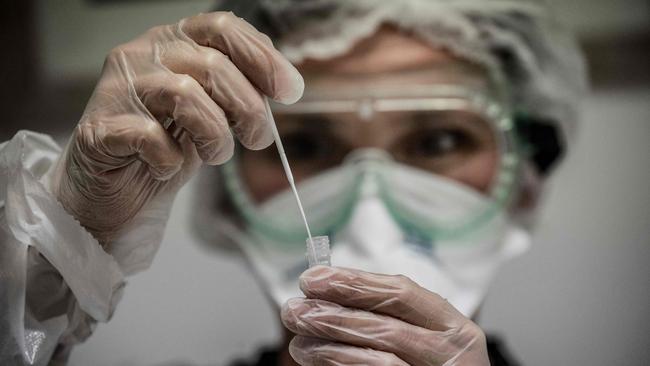
AFP 5.50pm: WHO chief in quarantine
The World Health Organisation chief is self-quarantining after contact with a person who tested positive for COVID-19.
“I have been identified as a contact of someone who has tested positive for #COVID19,” Tedros Adhanom Ghebreyesus said in a tweet on Monday.
“I am well and without symptoms but will self-quarantine over the coming days, in line with @WHO protocols, and work from home.”
Mr Tedros has been at the forefront of the UN health agency’s efforts to battle the pandemic.
He stressed on Twitter that “it is critically important that we all comply with health guidance”. “This is how we will break chains of #COVID19 transmission, suppress the virus, and protect health systems.”
The 55-year-old former Ethiopian minister of health and foreign affairs has for months reiterated that each person has a role to play in halting the spread of the virus.
READ MORE: Victoria’s record exodus revealed
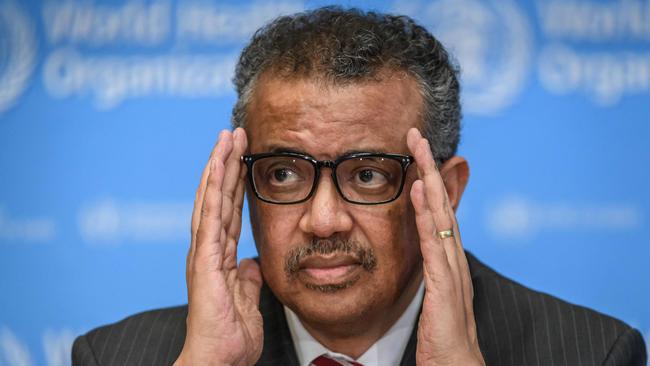
AFP 5.20pm: Peru’s Machu Picchu reopens
The Inca citadel of Machu Picchu, the crown jewel of Peru’s tourist sites, has reopened with an ancient ritual after a nearly eight-month lockdown due to the novel coronavirus pandemic.
For safety reasons, however, only 675 tourists will be able to access the site per day, just 30 per cent of the number of visitors pre-pandemic.
Under a fine drizzle and multicolored lights, an Inca ritual was held on Monday (AEDT) to thank the gods for the citadel’s reopening.
“Today, Machu Picchu opens. It opens with (health and safety) protocols, it opens to say that we are reactivating ourselves but with responsibility and great prudence, because we see everything happening in the world,” Foreign Trade and Tourism Minister Rocio Barrios said in a speech.
Opening Machu Picchu to the world shows “that we Peruvians are resilient,” Mr Barrios said later in an interview.
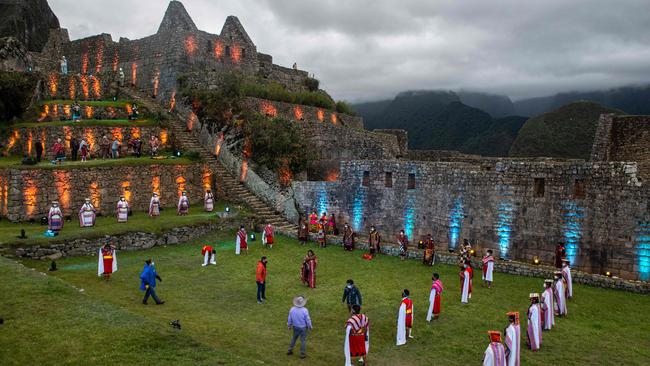
The coronavirus lockdown has been a body blow to the tens of thousands of people who make their living from the country’s tourism industry, especially those in the mountainous Cusco region where the stone citadel is located.
Scores of hotels, restaurants and tourism-related businesses throughout the region went bankrupt by the time a strict mandatory virus lockdown that lasted more than 100 days was lifted in July.
Taxi driver Eberth Hancco, who works at the airport of the city of Cusco, the former capital of the Inca empire, was among those affected.
“The situation has been very bad, because Cusco depends on tourism,” he said.
Machu Picchu, which means old mountain in Quechua, is the most enduring legacy of the Inca empire that ruled a large swathe of western South America for 100 years before the Spanish conquest in the 16th century.
The ruins of the Inca settlement, abandoned and overgrown by vegetation, were rediscovered in 1911 by the American explorer Hiram Bingham. In 1983, UNESCO declared Machu Picchu a World Heritage Site.
READ MORE: Baby boom in poor countries as rich hold off in pandemic
Robyn Ironside 4.47pm: Joyce renews calls for Queenland to fully reopen
Qantas CEO Alan Joyce has warned the newly re-elected Queensland Premier that “sometimes the popular decision isn’t the right one” has he continues to campaign for borders to reopen.
Annastacia Palaszczuk has confirmed the decision not to reopen Queensland to residents of greater Sydney or Victoria, will not be reviewed until the end of the month.
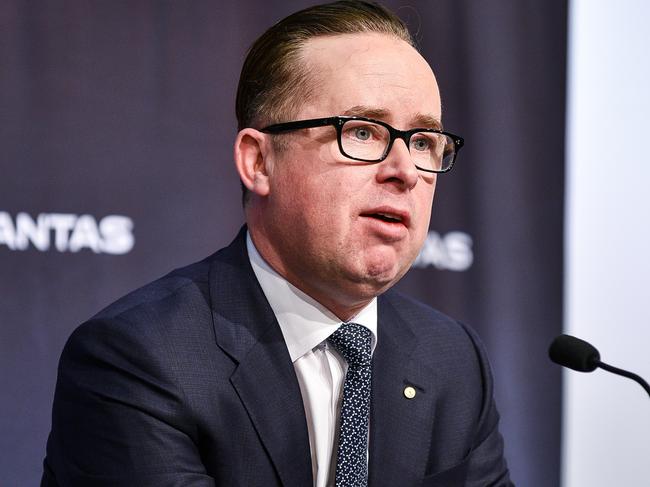
Speaking on Sydney’s radio 2GB on Monday, Mr Joyce described the Premier’s hard line on borders as “extremely frustrating” and said the stance was causing economic and social damage.
“What gets me is this is obviously popular. She’s won the election and congratulations to the Premier. But sometimes the popular decision is not the right decision and there’s a lot of factors going into this that clearly are not going into it,” Mr Joyce said.
“We have a very different position across the country.”
Read the full story here.
Heath Parkes-Hupton 4.16pm: Stranded Aussies slam rescue flight ‘ransom’
A woman has described the exorbitant prices being charged for rescue flights for Australians stranded overseas due to the coronavirus pandemic as “ransom money”.
An outraged Dr Alyse Brown made the claim on Twitter as she shared a picture of pricing for a one-way Qantas business class flight from London to Darwin on November 11 that totalled an eye-watering £4848 – or more than $A8900.
I just got an email from @Dfat offering my partner and I a repatriation flight home. 2 seats $17452 plus quarantine $5000 will cost us $22452. @ScottMorrison that’s not an offer of help, that’s ransom money. #removethecap #strandedAussies @abcnews @7NewsAustralia @9NewsAUS pic.twitter.com/5yQoGmjKIF
— Dr Alyse Brown (@Alyse01001) October 29, 2020
Those fares for herself and partner, plus the $5000 hotel quarantine bill they would both need to stump up on arrival home, meant they would be spending more than $22,000 to get back on home soil.
Read the full story here.
Rebecca Le May 4.01pm: Record low wage growth hurting Aussies
Australian wages rose at the lowest annual rate ever recorded last financial year in both the private and public sectors, with business activity almost grinding to a halt in the final quarter as the COVID-19 pandemic took hold.
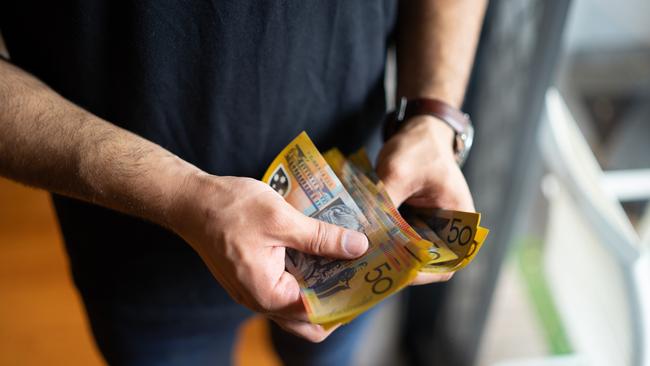
According to the latest Wage Price Index, which measures the change in hourly rates of pay and salaries, the seasonally adjusted price of labour only inched 0.2 per cent higher in the June quarter.
It was when the global health crisis was declared and nationwide restrictions peaked, slashing business activity.
Read the full story here.
Don Stammer 3.48pm: Clever asset allocation the key to thriving
With early signs coming through of the green shoots of economic recovery both here and abroad, many investors will be taking a fresh look at what, for them, is the best way of spreading their investment portfolios across the main asset classes.
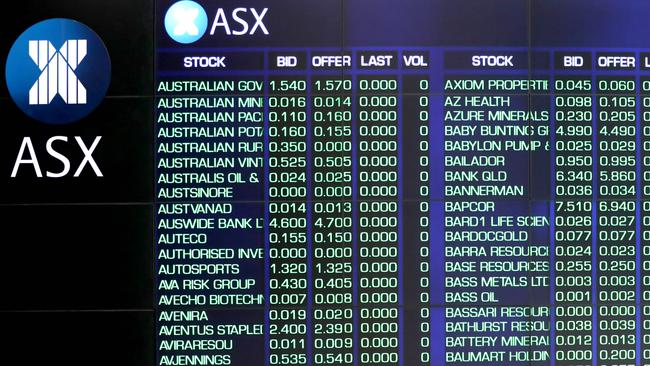
Asset allocation uses a framework that shows, for an individual investor — and taking into account the person’s investment objectives and risk tolerance — the percentages of their investments to be held across “defensive assets” (such as cash, term deposits, government bonds and corporate debt) and “growth assets” (such as Australian shares, international shares, commercial property, infrastructure, private equity and commodity funds).
Read the full story here.
Rachel Baxendale 3.40pm: DHHS ‘looking into’ hospital cases two months after pledge
Victoria’s Department of Health and Human Services says it is still “looking into” the numbers of people who acquired the virus while being treated in hospital for other conditions, almost two months after Chief Health Officer Brett Sutton said the department “can and should collect” such data, and pledged to “look into” making it publicly available.
Agreed. Didn’t have a number at hand but we can and should collect this. Will look into it. https://t.co/kpfdQh63MB
— Chief Health ðŸ©fficer, Victoria (@VictorianCHO) September 4, 2020
DHHS has released local government area data showing the locations of deaths and cases during the state’s coronavirus pandemic, as well as information on the gender and ages of the 819 people who have died with the virus in the state.
“Understanding precisely where someone caught coronavirus – the circumstances and location of acquisition – is often not known or obtainable, particularly during the peak of the pandemic,” a DHHS spokeswoman said.
“In Victoria, all deaths with a positive coronavirus diagnosis are included in the state’s toll, regardless of whether it was the overarching cause of death.
“This reporting is consistent across all states and territories to ensure the figures are comparable across the country.”
DHHS said it also did not have data on any comorbidities people who had coronavirus died with or of.
Victoria’s 819 deaths include 800 deaths which occurred as a result of the second wave of infections, linked to infection control breaches in the Andrews government’s hotel quarantine program.
This includes 652 deaths linked to aged care, with this figure including any resident of an aged care facility who died after testing positive to coronavirus, regardless of whether they acquired the infection at the facility.
It is not clear why the Department of Health and Human Services has not provided statistics for the number of people who contracted the virus after receiving hospital treatment, and the number who died, even if it is not clear whether they acquired the virus at the hospitals.
The Australian has been contacted by family members of two people who died after contracting the virus as patients at two different Melbourne hospitals.
DHHS said some of the “complexities” associated with determining whether patients had acquired the infection while in hospital included the lack of an internationally accepted definition of hospital acquired COVID, and the 14 day incubation period.
READ MORE: Victorian Supreme Court deems curfew valid
Erin Lyons 3.15pm: The state where COVID-19 will linger
NSW could have eliminated community transmission of coronavirus if the government chose to, but it didn’t, according to one leading epidemiologist.
Local infections are still popping up across Sydney and there are fears COVID-19 could unknowingly be circulating through the city’s southwest, including at a trampoline centre, where another case linked to the venue was recorded on Monday.
Victoria recorded its third consecutive day of zero cases while other states and territories haven’t recorded any cases of local transmission in weeks, or even months – mainly due to hard border lockdowns.
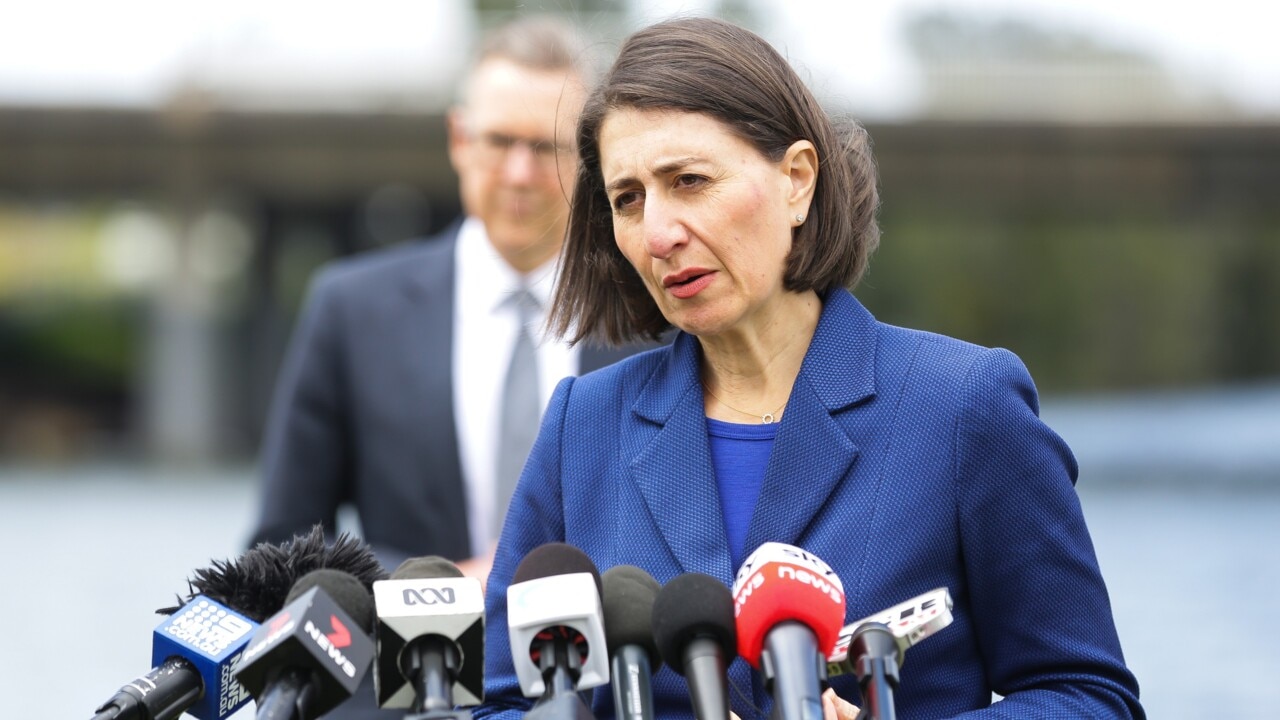
Epidemiologist Professor Adrian Esterman, at the University of South Australia, said its “suppression approach” could see other states and territories reluctant to open their borders to NSW.
“There was nothing stopping NSW from implementing slightly more stringency on restrictions to get down to zero if they wanted to but they clearly don’t want to and that’s the decision of the NSW government,” he said.
Read the full story here.
David Ross 3pm: Australia Post chief quits over watch scandal
Australia Post CEO Christine Holgate has resigned “with great sadness” after the Cartier watch scandal. Read more here
Olivia Caisley 2.30pm: New watchdog would have sweeping powers
Attorney-General Christian Porter says the Morrison government’s proposed Commonwealth Integrity Commission will have “greater powers than a royal commission” after releasing draft legislation for the public sector corruption watchdog.
While parliamentarians will be able to self-refer to the body, they will not be required to front public inquiries, unlike existing Independent Commission Against Corruption (ICAC) hearings.
Asked why politicians won’t be required to front public hearings and whether the public accept this, Mr Porter said it would be a “matter of public debate.”
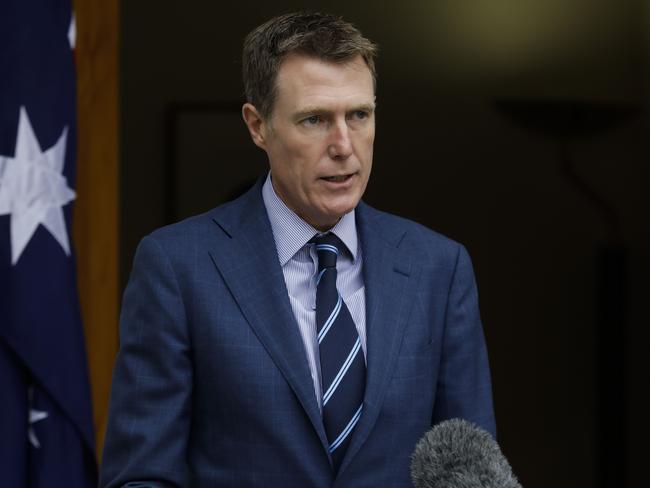
He said the new watchdog would need to strike a balance between preserving people’s liberties and having “an extremely powerful investigative body.”
“The government takes the view that ultimately a court should be making a public determination of guilt or innocence, not a report,” he said.
Mr Porter on Monday said the CIC legislation would cover 143 offences and would bring in some new offences, including requiring the heads of law enforcement agencies to refer corruption issues relating to their agencies to the CIC.
Mr Porter said the model would see the CIC subsume the Australian Commission for Law Enforcement Integrity.
“The law enforcement integrity division - which is what ACLEI will become in the new integrity commission - will have coverage of the Australian Criminal Intelligence Commission, the Australian Federal Police, the Australian Transaction Reports and Analysis Centre, the Department of Home Affairs, the Department of Agriculture, Water and the Environment and its new jurisdiction over the Australian Competition and Consumer Commission, the Australian Prudential Regulation Authority, the Australian Securities and Investments Commision and the Australian Taxation Office,” he said.
Agents and officers working for the corruption watchdog will be able to assume false identities for the purposes of their investigations.
He defended the time it had taken to deliver the draft legislation, declaring it had been delayed by the onset of the coronavirus pandemic.
READ MORE: Federal watchdog revealed
Greg Brown 2.20pm: Federal corruption watchdog unveiled in Canberra
The wheels are in motion to establish a Commonwealth Integrity Commission from next year. Read more here
Geoff Chambers 1.50pm: Record Melbourne exodus revealed
More than 25,000 people abandoned Melbourne in the June quarter – ahead of the COVID-19 second wave taking grip – with the city suffering its largest change in net internal migration on record.
Data released by the Australian Bureau of Statistics on Monday revealed capital cities across the country had recorded the biggest net loss from internal migration in history during the pandemic.

Between April and June, 85,500 people moved interstate, reflecting a 15 per cent drop compared to the same period last year.
Queensland gained the most people from net interstate migration, increasing by 6800, with Brisbane recording a net gain of 3200 people.
Victoria registered the largest change in net migration across the country, with 6900 people moving to NSW. The ABS said “more people moved from Victoria to NSW (6900) than from NSW to Victoria (6100) for the first time since the June 1997 quarter”.
Read the full story here
Robert Gottliebsen 1.20pm: The clock is ticking on Dangate
Peta Credlin’s brilliant journalism has flushed out what looks like a major cover-up in Victoria. The onus is now on the media to pursue it. Read more here
Charlie Peel 12.50pm: Frecklington quits as Qld LNP leader
Deb Frecklington will resign as leader of the Liberal National Party. The stunning about face comes less than 48 hours after the Opposition Leader told an election night rally that she would continue on in the position, despite a crushing defeat.
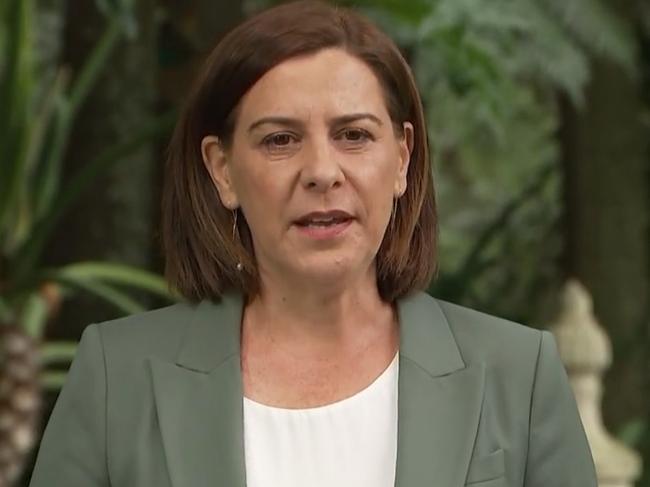
At a press conference at Parliament House on Monday morning, Ms Frecklington said she would call for a spill of the party leadership but would not recontest herself.
Discussions with her husband and three daughters convinced her she should step down.
She will continue in her role as Nanango MP. Read the full story here
READ MORE: Why Morrison should be worried about Qld result
Rachel Baxendale 12.45pm: Court rules Victoria’s curfews legal
Victoria’s Supreme Court has dismissed a Mornington Peninsula cafe owner’s challenge to the Andrews government’s coronavirus curfew. Read more here
Staff Reporters 12.40pm: Prince William’s Covid battle revealed
The Duke of Cambridge battled COVID-19 in April, but kept the illness secret to avoid causing alarm in the UK. Read more here
Heidi Han 12.25pm: China to insist on ‘double negative’ arrivals
Australia is likely to join New Zealand, the US, the UK and a list of countries from where passengers heading to China are required to present “double negative” results of both serum IgM antibody test and usual nucleic acid test before boarding their flight, as China tightened its measures to counter a resurgence of COVID-19 worldwide.
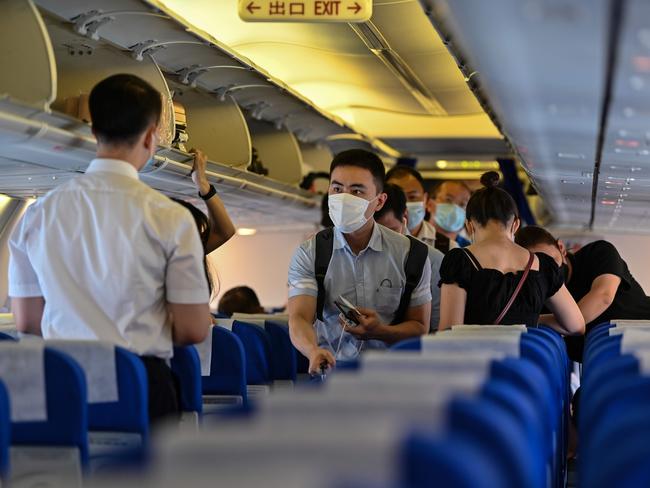
From November 7, all Chinese and foreign passengers bound for China must obtain the two certificates showing negative results from a testing centre approved by the embassy 48 hours before boarding, according to a notice issued by China’s embassy in New Zealand, despite the country having successfully contained community transmission.
A potential hurdle for Australia is understood to be lack of providers of IgM Serology tests, from venous or finger prick blood samples, comparing to more commonly used nucleic acid test.
The Australian can reveal that the Chinese embassy has started consultation with local laboratories to potentially conduct the required test.
Should the new measure apply to Australia, Chinese nationals who are seeking to return to their country, as well as Australians who are permitted to fly to China for important family affairs and essential work during the pandemic, would be affected.
According to the new measure, passengers transiting through a third country must also complete the second nucleic acid and IgM antibody tests at the country where they transit, almost making it impossible for non-direct flight passengers to China.
The new measure came as a rapid rebound of COVID-19 cases globally, and China is scrambling to quarantine and treat increasingly imported infected cases.
READ MORE: Companies fret despite rebound
Angelica Snowden 11.50am: Berejiklian can’t get a response from Palaszczuk
NSW Premier Gladys Berejiklian says she has congratulated Annastacia Palaszczuk on winning a third term in Queensland and flagged she was “keen” to talk about borders, which she said is creating “chaos”.
Ms Berejiklian said she messaged Ms Palaszczuk but had not received a response.
“I sent her a congratulatory message especially acknowledging her win and fighting a campaign in the middle of a pandemic,” Ms Berejiklian said.
“But I also highlighted that I was keen to speak to her on the border issue and I hope she takes up that opportunity,” she said.
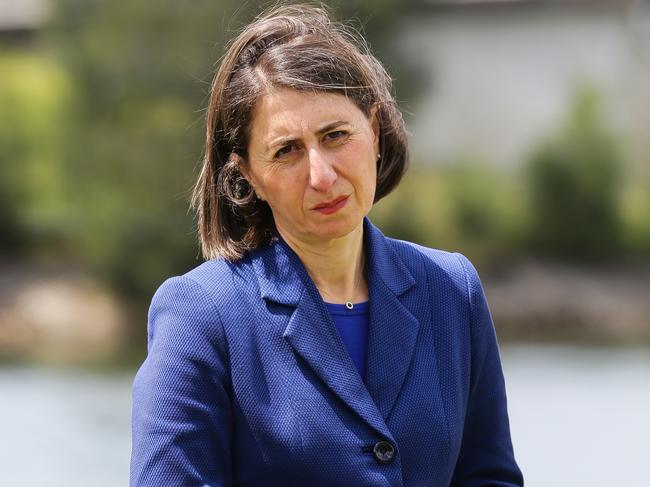
Based on an overall trend of low case numbers in her state, the premier said NSW residents should be welcome in every state and territory throughout the country.
“I want to also stress in relation to Victoria, that the NSW government will move forward with confidence, and also with speed,” she said.
“Dr Chant, myself and my colleagues have had a good discussion about how quickly we’ll move and I wouldn’t be surprised if we moved more quickly against Victoria than Queensland did against us.”
She said the details of who could enter Queensland from NSW needed to be clarified, as some people live in regional local government areas but occasionally travel into Sydney for work.
“That’s up to the Queensland Government to determine and that’s the chaos they’re creating but I want to reduce the stress on citizens generally, and I think the best way to reduce the stress is to be compassionate and get rid of that Queensland NSW border.”
After Ms Berejiklian said she was concerned some Sydney restaurants were not complying with COVID-19 contact keeping requirements, she flagged mandatory QR codes could be introduced.
NSW Chief Health Officer Kerry Chant called out one restaurant in Liverpool after an infectious case visited the venue on October 25, but contact details were not left by all patrons.
“It’s been quite concerning that we have had difficulties getting from premises, (details of) people who were attending those premises,” Dr Chant said.
“QR codes are our preferred method, just because of the speed in which that data and the digital format which can be transmitted to us to facilitate contact tracing,” she said.
Angelica Snowden 11.20am: New case linked to known Sydney cluster
The locally acquired case was reported yesterday but included in today’s numbers.
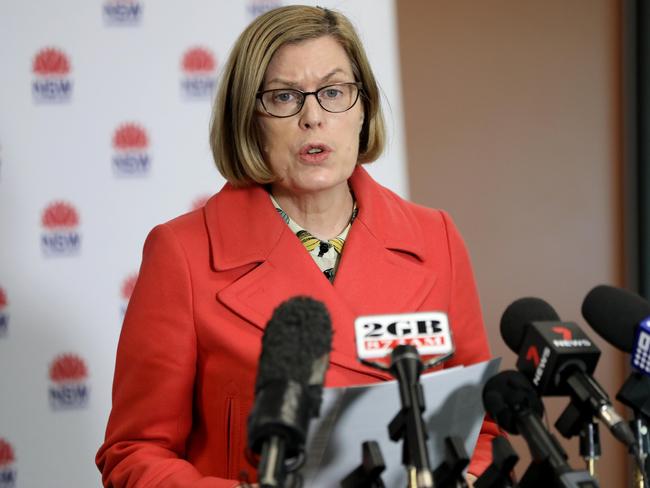
It is the sixth case linked to the Hoxton Park cluster. The case is the second child to have contracted the infection at Flip Out in Preston.
They attended Bambino’s Kindergarten in Horningsea Park on October 29 and October 30 and any child or staff member who attended the centre on these days is considered a close contact and must get tested immediately.
It is understood the child contracted COVID from another child on October 25.
Angelica Snowden 11.15am: NSW Premier reveals Covid ‘concern’
There have been seven new cases of COVID-19 reported in NSW overnight, with one case that was locally acquired.
NSW Premier Gladys Berejiklian said she was “concerned” some restaurants in Sydney were not complying with COVID-19 restrictions and had made it difficult for contact tracers because they “did not do the right thing”.
“We don’t have any room for complacency,” Ms Berejiklian said.
The latest case was a child who contracted COVID at an indoor trampoline park in south Sydney.
READ MORE: Lessons from the Covid resurgence
Rachel Baxendale 11.05am: Victoria continues Covid recovery
In a sure sign things are finally returning to normal as Victoria emerges from a three-and-a-half month lockdown, Transport Minister Jacinta Allan has given the state’s coronavirus update at the Coburg railway station in Melbourne’s north as she marked the completion of the nearby level crossing removal.
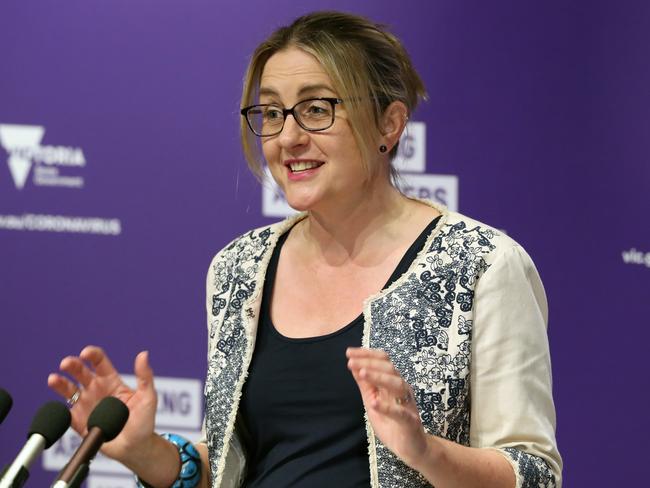
Victoria is now down to 49 active cases – 12 fewer than Sunday – with just two people in hospital with coronavirus and none in intensive care, on what is effectively the third consecutive day with no new cases after Saturday’s sole case was reclassified as a false positive.
It is also the third consecutive day during which Premier Daniel Andrews has not appeared at a press conference, after addressing the media for 120 days straight from the Treasury Theatre.
Victoria has now had 20,345 confirmed cases of coronavirus, and 819 deaths, all but 19 of which occurred as a result of breaches in the Andrews government’s hotel quarantine program in late May and early June.
While retail and hospitality businesses have reopened after a 111-day stay-at-home lockdown was finally lifted last Wednesday, strict capacity limits remain, as does a 25km travel limit for Melburnians, and a prohibition on travel between Melbourne and regional Victoria, both of which are set to be lifted from 11:59pm on Sunday.
READ MORE: Can Trump cash in on late surge?
Angelica Snowden 10.50am: Farage launches UK anti-lockdown party
A new anti-lockdown party will be launched by Nigel Farage and Richard Tice on Monday, replacing the The Brexit Party.
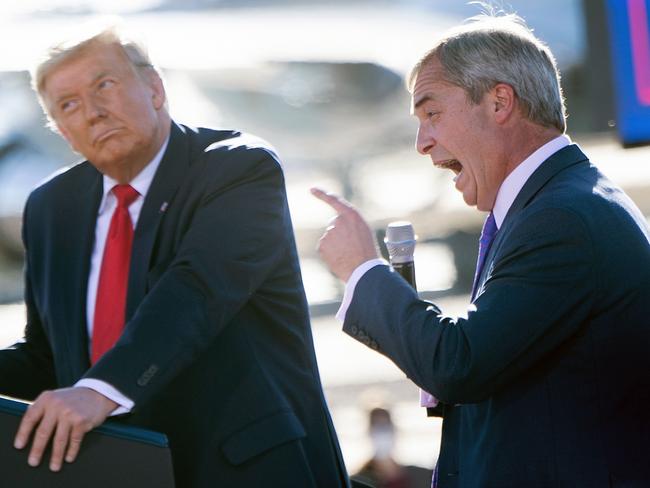
The UK Telegraph reported the move could alarm libertarian conservative MPs after Mr Farage and Mr Tice wrote in a joint article in the paper “lockdowns don’t work”.
They said the new party will protect the most vulnerable from COVID-19 and allow the rest of the population to develop herd immunity.
A submission was made to the Electoral Commission last week to change the name of the party from the ‘Brexit Party’ to ‘Reform UK’.
The party is planning to stand a range of candidates at the May elections, including the policing and crime commissioner elections and the next general election in 2024.
READ MORE: Business demands climate change action
Mackenzie Scott 10.20am: National house prices show October rise
National residential property prices rose through October for the first time since the coronavirus induced downturn set in six months ago. Read more here
Troy Bramston 10am: Trump’s path to a shock election win
We may not know the outcome on Wednesday but we’ll probably know where it’s headed by midafternoon. Read more here
Angelica Snowden 9.45am: Victorians in quarantine ‘allowed to come and go’
Infected abattoir workers were the first locals to quarantine at the Rydges Hotel in Victoria and the Department of Health and Human Services gave them freedoms to come and go from the hotspot, an investigation has alleged.
Security subcontractor Andrew McLean’s Elite Protection services, who managed security at Melbourne’s Rydges Hotel, the centre of Victoria’s Covid second wave outbreak, told Sky News he made a 500-page submission to the hotel quarantine inquiry but it was not tendered as evidence.
“I submitted it and lodged it, and got the acceptance from the lawyers,” he said.
“They even contacted me to tell me that it was there. And also they gave us updates through the inquiry about when ... they could want me to speak to us.
“So I was sitting there waiting to be called any minute, and it didn’t happen.”
Mr McLean told Sky News’s Peta Credlin the Department of Health and Human Services, under deputy chief health officer Anneliese van Diemen, said quarantining Cedar Meats workers did not have to follow directions given to them by security guards because they were voluntarily isolating at the hotel.
The abattoir workers were given a written direction which outlined their rights, Mr McLean said.
“That document basically shut down every single policy we’d put in place about safety because it basically is a voluntary quarantine policy,” he said.
“So … if a quarantine guest goes to leave, my guard calls the police, they’re apprehended and arrested.
“If a Cedar Meats work person decides they’re going to leave, we call the police, they show that document, the police can’t touch them.”
EPS was fired in early May after a sexual harassment complaint was made against one of its staff. Mr McLean has rejected that allegation.
READ MORE: Economic sector that’s defying the downturn
Rachel Baxendale 9.35am: Victoria hits its best number in five months
The zero cases in Victoria follow no cases on Sunday, and a single case on Saturday which was found to be a false positive, meaning Victoria has effectively had three straight days with no new cases after coming out of stay-at-home lockdown last Wednesday.
Zero new cases and no lost lives reported in the last 24 hours. The 14 day average is down to 1.9. There is 1 case with an unknown source. More info: https://t.co/eTputEZdhs#COVID19VicData pic.twitter.com/XG94AhLGzI
— VicGovDHHS (@VicGovDHHS) November 1, 2020
Melbourne’s 14-day daily average is now below two for the first time since June, at 1.9 on Monday and down from 2.2 on Sunday.
There has been one case for which contact tracers have been unable to establish a source of infection in the most recent fortnight for which the statistic is available – spanning October 17 to October 30.
Regional Victoria has not had a case for more than a fortnight. The number of active cases statewide was 61 on Sunday.
READ MORE: How it all went wrong for England
Joyce Moullakis 9.30am: Westpac’s profit smashed by 62pc
Westpac full-year cash profit slumps 62% to $2.6bn but the bank will restart dividend payments. Read more here
Rachel Baxendale 9.05am: Zero new cases in Victoria again
Victoria has recorded no new cases of coronavirus and no deaths on Monday.
The numbers come after Australia notched up its first day in more than five months with no new community-acquired cases nationwide on Sunday.
Angelica Snowden 8.50am: Aussie lobster next on China’s trade hit list?
There are “serious concerns” another Australian export could be tied up in a trade war with China, after lobsters were held up at a tarmac in China, Agriculture Minister David Littleproud says.
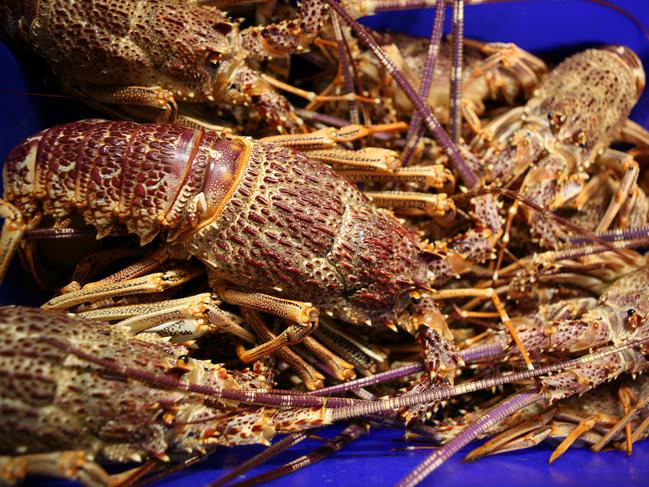
Mr Littleproud said his department had been made aware of the incident in the past few days.
“As we understand they have actually now imposed … an inspection of all quantities from 50 per cent to 100 per cent of rock lobster going into China,” Mr Littleproud told the ABC.
“They are saying they want to understand if there are trace elements of minerals and metals in it. We test before they go and that is not the case so we are asking why this action is being taken against Australian rock lobster.”
Mr Littleproud would not advise exporters to hold off sending the lobsters for now and said it was a “commercial decision”.
“Ultimately that will be a commercial decision they make but they need to be able to make that decision with the understanding that it may take up to a couple of days to get those rock lobsters into the markets they’re importing into.”
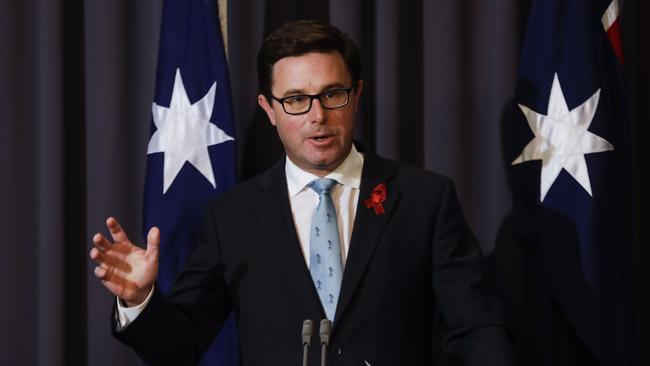
Australian cotton growers recently felt trade tensions with China after producers reported authorities discouraged Chinese spinning mills from using Australian cotton.
It was also reported that Chinese customs authorities told companies to stop importing Australian coal.
READ MORE: Simon Benson — Problems by the pocketful lie ahead
Angelica Snowden 8.20am: ‘We must remember this virus hasn’t gone away’
Australia’s “major risk” in its ongoing battle against COVID-19 is complacency after the country recorded its first day of zero community transmission, the acting chief health officer said today.
Paul Kelly warned the country would continue to see an increase in coronavirus cases after state governments in NSW, Queensland and Western Australia agreed to lift the cap on international arrivals in September.
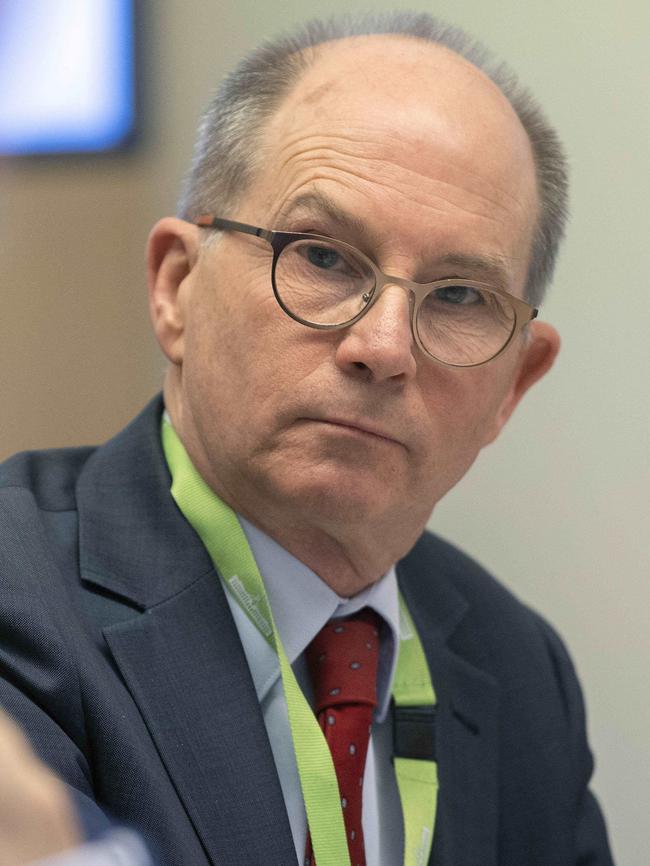
“We need to remember that this virus hasn’t gone away,” Dr Kelly told ABC Radio National.
“(There were) zero community cases yesterday but there was and continues to be an increase in cases coming into our quarantine hotel.
Health authorities would take a “more targeted” approach to COVID-19 testing after fewer people continue to get tested on weekends, Dr Kelly said.
“On Thursday last week we had over 50,000 tests around the country 75 per cent of those were in New South Wales and Victoria and that’s not surprising.
“It’s where the cases have been over recent times and we’re moving to a more targeted approach in many states and that’s very appropriate at this time.
“The use of wastewater testing to say where there may be cases has led to really a strong response from the community and we saw that in Shepparton,” he said.
Dr Kelly also said Australia’s chief health officials, including former Chief Health Officer Brendan Murphy, initially condoned Victoria’s hard lockdown to manage the COVID-19 outbreak sparked by breaches in hotel quarantine.
“We looked at the modelling and where it might go without those drastic measures and we supported them in their view that that was what needed to happen,” he said.

“The lockdown really that’s for the Victorian Government and they will need to justify and explain that to the public.
“They are in a very good space now and we have been saying for some time now that it would be good to start opening up because that’s what’s going to test their contact tracing abilities.”
READ MORE: Crisis blamed for rising anxiety levels
Angelica Snowden 7.20am: Tourism ‘big loser’ in Qld border closure
The “losers” out of Annastacia Palaszczuk’s victory in Queensland are tourism operators who will not be able to kick start business while the state retains a hard border closure, Queensland senator Matt Canavan says.
The liberal senator conceded defeat after Ms Palaszczuk’s Labor Party won a third term in government at the weekend Queensland election.
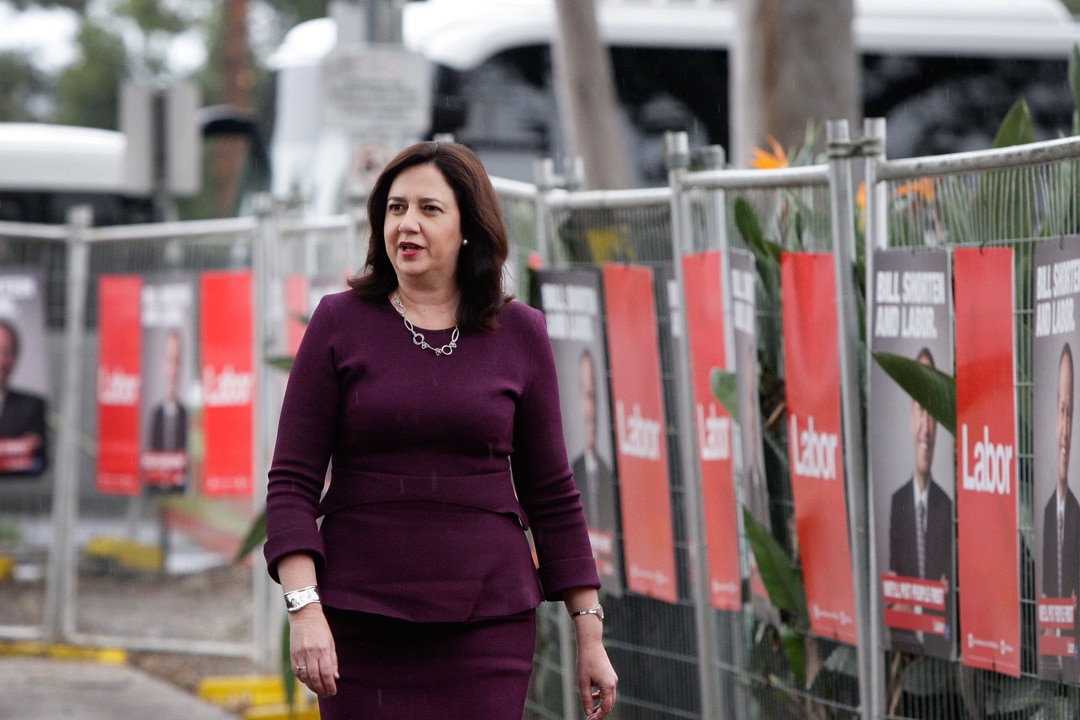
“It looks like she’s going to keep those borders shut and unfortunately some losers from the weekend are all those tourism businesses in Cairns and Whitsundays and the Gold Coast because they’re really hurting,” Senator Canavan told the Today show.
“We expected to do a lot better especially in north and central Queensland where I’m from.
“The One Nation vote collapsed but it largely went to the Labor Party on the back of that strong border stance.”

He described Ms Palaszczuk’s 28-day rule of no COVID-19 community transmission before borders are opened as “ridiculous”.
“It’s proven to be a pretty unreachable hurdle,” he said.
“I’ve always been in favour of sensible restrictions on travel but everybody wants to come to Queensland.
“Everybody wants to be up here … I want them to come too, because we need those businesses to get money in their till so they can employ people and get people back to work.”
READ MORE: Editorial — Palaszczuk must lead Queensland to full economic potential
Jacquelin Magnay 6.30am: Britons stranded abroad as Boris bans travel
Thousands of British holiday-makers are stranded abroad after Boris Johnson barred travel out of the UK for anything but business.
The British Prime Minister had not mentioned the ban in his announcement of a month-long lockdown on Sunday.
But after the decision to bar outward bound travel from midnight Wednesday – buried in the small print of the official government guidelines – was revealed, one of the country’s largest low cost airlines pulled the plug on return flights.
We will get through this - but we must act now to contain the spread of coronavirus.
— Boris Johnson (@BorisJohnson) October 31, 2020
While Christmas will be very different this year, it is my sincere hope and belief that by taking tough action now, we can allow families across the country to be together. (9/10)
Even as Britons flocked to Heathrow to get a holiday in the sun while it was still legal, EasyJet said it would only honour flights until midnight Wednesday.
The airline’s decision has left tens of thousands of holiday-makers, many of whom had been encouraged by Downing Street to get some vitamin D in the Canary Islands, wondering how they will get home.
Travel operators say the issue in the Canaries is particularly galling and highlights the chaotic and confusing messages out of Downing Street.
From Thursday 5 November until 2 December, you must stay at home.
— UK Prime Minister (@10DowningStreet) October 31, 2020
For more information on the new measures watch our video or visit: https://t.co/shgzOurdZC pic.twitter.com/KrBviO8kmO
Read the full story here.
Patrick Commins 4.45am: ‘Climate Covid every year if we don’t act’
Australia will suffer the economic equivalent of a COVID-19 crisis every year by 2050 if policymakers do not take decisive action now to combat climate change, new modelling from Deloitte Access Economics says.
The research offered a stark choice to policymakers: devise a new growth plan for the economy or face $3.4 trillion in lost GDP and 880,000 lost jobs cumulatively over the next 50 years.
“COVID was always a risk, and Australia has risen beautifully to it,” Deloitte partner Chris Richardson said.
But the economic toll from the pandemic was a taste of things to come if climate change was left unchecked, he said. “This is a risk that we get COVID year after year after year.”
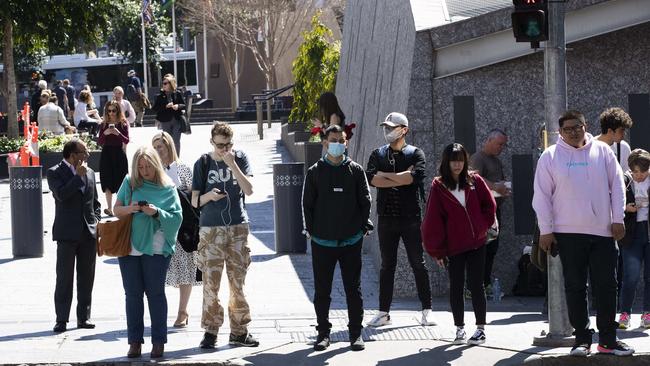
The Deloitte economist said federal and state governments should direct the tens of billions in infrastructure and stimulus spending in coming years into projects that, as much as possible, addressed the twin aims of providing growth-enhancing infrastructure while “future-proofing” the economy and jobs from the impacts of global warming.
Read the full story here.
Patrick Commins 4.35am: Jobs key as state looks to make things work
Premier Annastacia Palaszczuk’s first order of business will be to start work on a much-delayed budget to extend Queensland’s robust post-COVID recovery and drive down unemployment levels, despite having the highest state debt levels in the country.
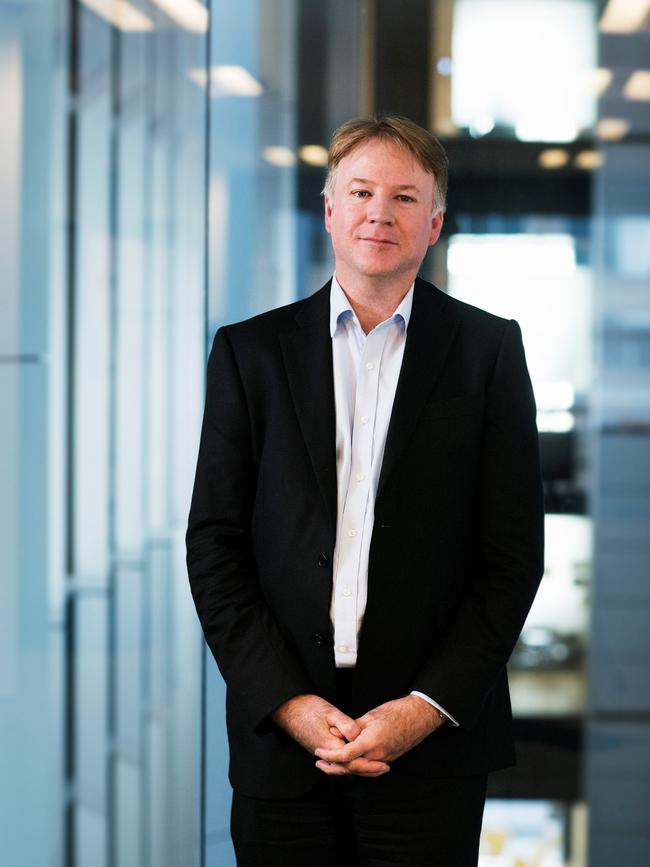
Queensland, with its closed borders and good health outcomes, has enjoyed a relatively rapid reopening. Since the depths of the downturn in May, employment in the Sunshine State has returned to 98 per cent of the pre-pandemic level, in line with another standout state, Western Australia, based on Australian Bureau of Statistics figures.
This compares with NSW employment levels of 97.6 per cent of February levels, and 93.9 per cent in Victoria, which is only now emerging from its lockdown.
The movement of people around Brisbane’s CBD in mid-October was at 66 per cent that of January and February, based on Roy Morgan analysis of mobile phone location data. While still depressed, it compares favourably with equivalent rates of 44 per cent in Sydney and 15 per cent in Victoria.
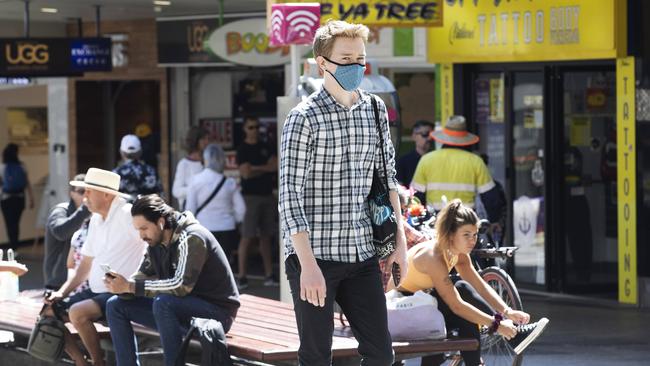
Read the full story here.
David Penberthy 4.15am: Men bearing brunt of pandemic: Labor MP
Men are now the biggest economic victims of the coronavirus pandemic but their plight is being ignored due to false perceptions of male privilege, according to Labor spokeswoman Clare O’Neil.
In a major speech to the McKell Institute on Monday, the Melbourne MP will call for the end of gender wars and say there needs to be a recognition that male workers are suffering in greater numbers than women.
Ms O’Neil will tell the Labor-aligned think tank that evidence shows women are now returning to jobs in retail, hospitality and other female-dominate sectors hardest hit by the initial COVID-19 lockdown, but 3.3 million lower-skilled male workers in the suburbs and regions are bearing the longer-term structural pain of the pandemic.
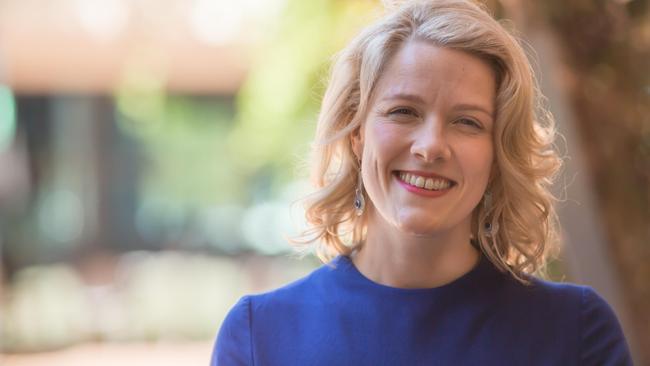
The problem is made worse because public debate has become so centred on gender lines that the suffering of these men is ignored or dismissed because of an ideological view that all men enjoy greater economic power.
“It’s not a competition between the genders, especially when it comes to who is doing it tougher in a bloody awful recession,” Ms O’Neil will tell the think tank.
“The point I am making is not that women are not suffering. Of course they are. My point is that everyone is suffering.
“Women had it worse to begin with. Now it is men, and there is evidence that as the months progress, we may see more of this.
“When women were clearly worst affected, it generated a very lively political conversation. And now that men are more severely affected, it feels like a problem we are less comfortable talking about.”
REMINDER: McKell Victoria's digital event In Conversation with @ClareONeilMP is next Monday 2 Nov, 12.30pm
— McKell Institute (@McKellInstitute) October 30, 2020
The event will also feature @ryanbatchelor and Wade Noonan
Registration is free | https://t.co/lbsV4ndxLW pic.twitter.com/twPJQZwCH6
Read the full story here.

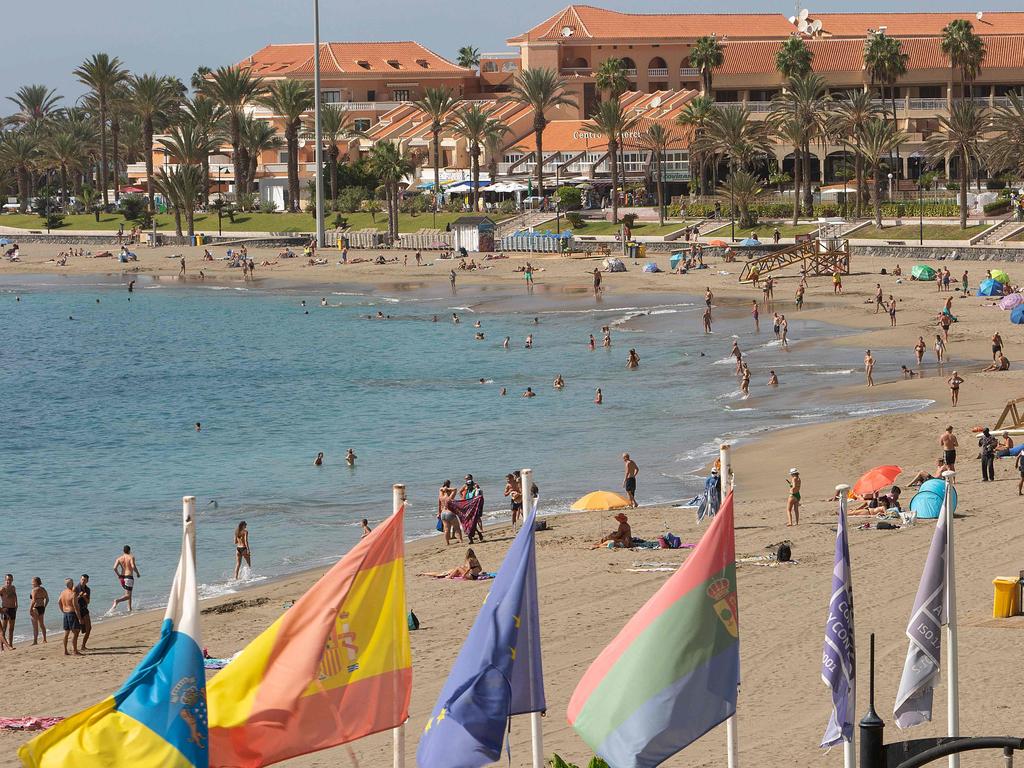
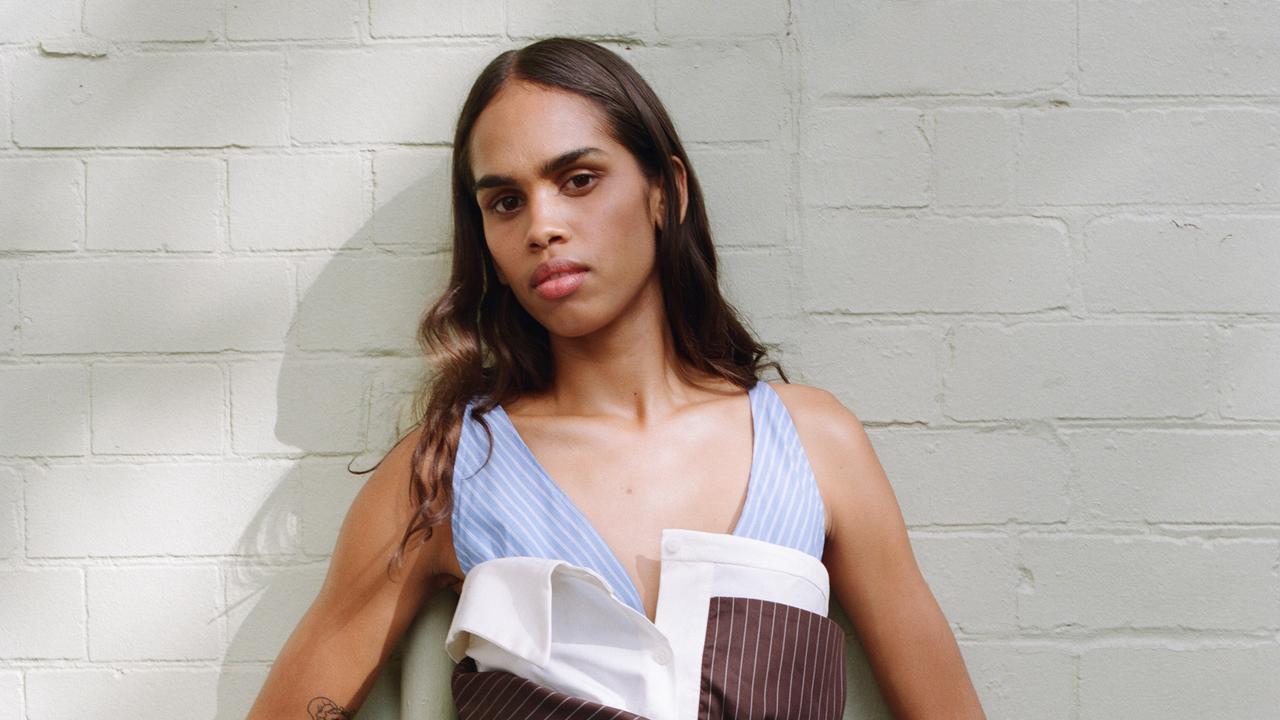
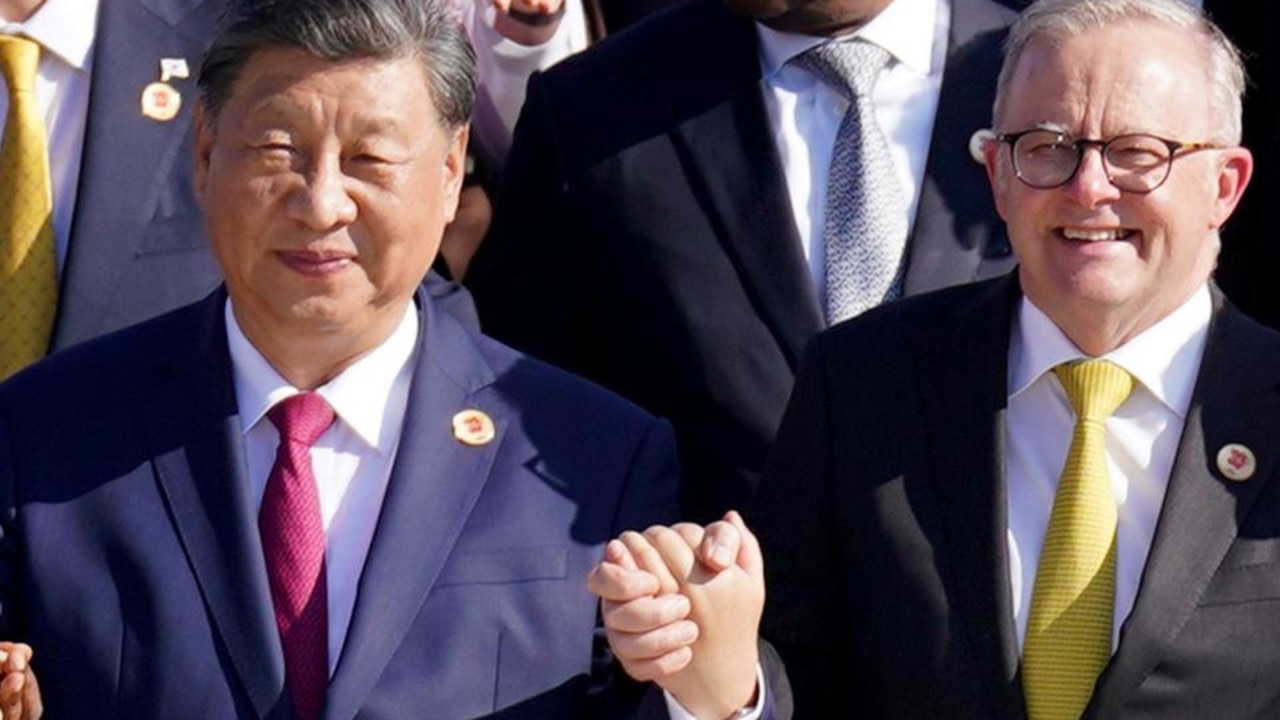
To join the conversation, please log in. Don't have an account? Register
Join the conversation, you are commenting as Logout